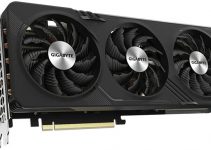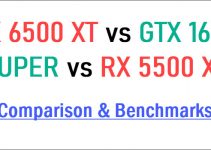GeForce RTX 5060 Ti 16GB is the fifth RTX 50 series graphics card launched by Nvidia in 2025. RTX 5060 Ti 16GB sits below the RTX 5070 in the GeForce RTX 50 series. RTX 5060 Ti is available in both 8GB and 16GB VRAM versions and is a mainstream mid-range graphics card for 1080p and 1440p gaming. The main competitor of RTX 5060 Ti 16GB is its predecessor, RTX 4060 Ti 16GB, and RX 7700 XT from AMD. RTX 5060 Ti 16GB is around 13 percent faster than the RTX 4060 Ti 16GB and 2 percent faster than the RX 7700 XT. Moreover, the RTX 5060 Ti has some features and functionality that its competitors lack. So, if you want to know how the RTX 5060 Ti compares against its competitors, please go through the comparison below.
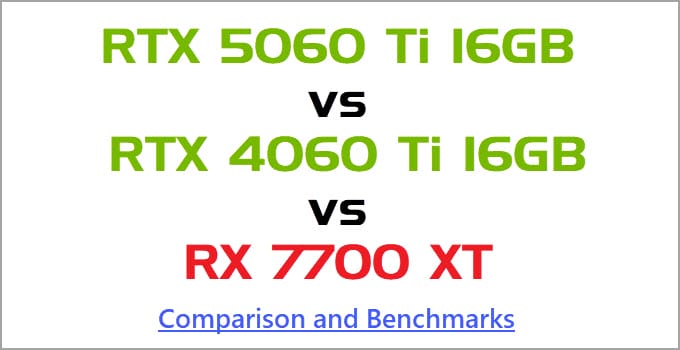
RTX 5060 Ti 16GB vs RTX 4060 Ti 16GB vs RX 7700 XT Comparison and Benchmarks
A quick comparison between RTX 5060 Ti 16GB, RTX 4060 Ti 16GB, and RX 7700 XT graphics cards based on their specifications, gaming performance, pricing, power consumption, and features.
GPU Architecture
RTX 5060 Ti is built on Nvidia’s Blackwell GPU architecture on a 5nm manufacturing process. It uses GB206 GPU chip and has 4608 CUDA Cores, 36 RT Cores (4th Generation), and 144 Tensor Cores (5th Generation). RTX 4060 Ti 16GB is built on Nvidia’s Ada Lovelace architecture on a 5nm fabrication process. The card uses an AD106 GPU Chip and has 4352 CUDA Cores, 34 Ray Tracing (RT) Cores, and 136 Tensor Cores.
RX 7700 XT is built on the RDNA 3 GPU architecture and uses a chiplet design where the core GPU components are placed on the Graphics Compute Die (GCD). The Memory Cache and controllers reside on Memory Cache Dies that surround the GCD. The GCD is built on a smaller 5nm fabrication process, while MCDs are built on a 6nm manufacturing process. The card uses Navi 32 GPU Chip and has 3456 Stream Processors, 54 Ray Accelerators, and 108 AI Accelerators.
Must Read: CUDA Cores vs Stream Processors Difference
| RTX 5060 Ti 16GB | RTX 4060 Ti 16GB | RX 7700 XT | |
| GPU Chip | GB206 | AD106 | Navi 32 XL |
| GPU Architecture | Blackwell | Ada Lovelace | RDNA 3 |
| Fabrication Process | 5nm | 5nm | 5nm |
| CUDA Cores/Stream Processors | 4608 CUDA Cores | 4352 CUDA Cores | 3456 Stream Processors |
| RT Cores | 36 (4th Generation) | 34 (3rd Generation) | 54 |
| Tensor Cores / | 144 (5th Generation) | 136 (4th Generation) | 108 |
Video RAM [VRAM]
RTX 5060 Ti comes with 16GB GDDR7 memory with a 128-bit interface. It has a memory speed of 28 Gbps and generates a memory bandwidth of 448 GB/s. RX 7700 XT comes with 12GB GDDR6 video memory with a 192-bit interface. The memory runs at a speed of 18 Gbps and generates a bandwidth of 432 GB/s. RX 7700 XT also has 48 MB Infinity Cache, an ultra-fast cache memory, which increases the peak memory bandwidth to up to 1995 GB/s. On the other hand, RTX 4060 Ti 16GB comes with 16GB GDDR6 video memory with a 128-bit interface. It has a memory speed of 18 Gbps and generates a bandwidth of 288 GB/s.
| RTX 5060 Ti 16GB | RTX 4060 Ti 16GB | RX 7700 XT | |
| Memory Size | 16 GB GDDR7 | 16 GB GDDR6 | 12 GB GDDR6 |
| Memory Interface | 128-bit | 128-bit | 192-bit |
| Memory Speed | 28 Gbps | 18 Gbps | 18 Gbps |
| Memory Bandwidth | 448 GB/s | 288 GB/s | 432 GB/s |
| Infinity Cache | NA | NA | 48 MB |
Features
All three graphics cards are VR-ready and support DirectX 12, OpenGL 4.6, Vulkan, AV1 Encode/Decode, Real-Time Ray Tracing, and variable refresh rate technologies G-Sync/FreeSync. RTX 5060 Ti supports PCIe 5.0 (x8) while RTX 4060 Ti and RX 7700 XT support PCIe 4.0 interface, but the PCIe bandwidth of RTX 4060 Ti is limited to x8 only. Regarding image upscaling technologies for increasing FPS in games, RTX 5060 Ti supports DLSS 4, RTX 4060 Ti supports DLSS 3, while RX 7700 XT supports AMD FidelityFX Super Resolution (FSR 3). Regarding video output ports, the RTX 5060 Ti supports DisplayPort 2.1b and HDMI 2.1b, the RX 7700 XT supports DisplayPort 2.1a and HDMI 2.1a, and the RTX 4060 Ti supports HDMI 2.1a but does not support DisplayPort 2.1.
| RTX 5060 Ti 16GB | RTX 4060 Ti 16GB | RX 7700 XT | |
| Bus Interface | PCIe 5.0 x8 | PCIe 4.0 x8 | PCIe 4.0 |
| DirectX | 12 Ultimate | 12 Ultimate | 12 Ultimate |
| OpenGL | 4.6 | 4.6 | 4.6 |
| Vulkan | 1.4 | 1.2 | 1.2 |
| SLI / CrossFire | No | No | No |
| VR Ready | Yes | Yes | Yes |
| G-Sync/FreeSync | Yes | Yes | Yes |
| HDMI 2.1 | Yes | Yes | Yes |
| DisplayPort 2.1 | Yes | No | Yes |
| AV1 Support (Encode/Decode) | Yes | Yes | Yes |
| Real-Time Ray Tracing | Yes | Yes | Yes |
| Deep Learning Super Sampling (DLSS) | DLSS 4 | DLSS 3 | No |
| FidelityFX Super Resolution (FSR) | NA | NA | FSR 3 |
Gaming Performance
Here are the gaming benchmarks of these cards at 1080p and 1440p resolution in the latest AAA games.
1080p Gaming Benchmarks
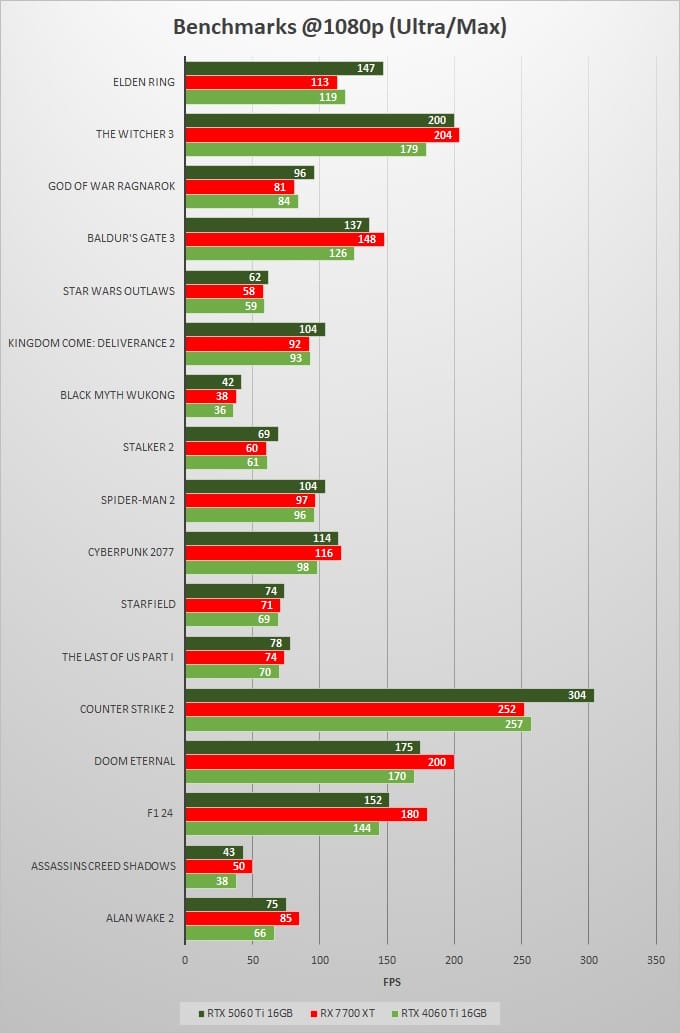
1440p Gaming Benchmarks
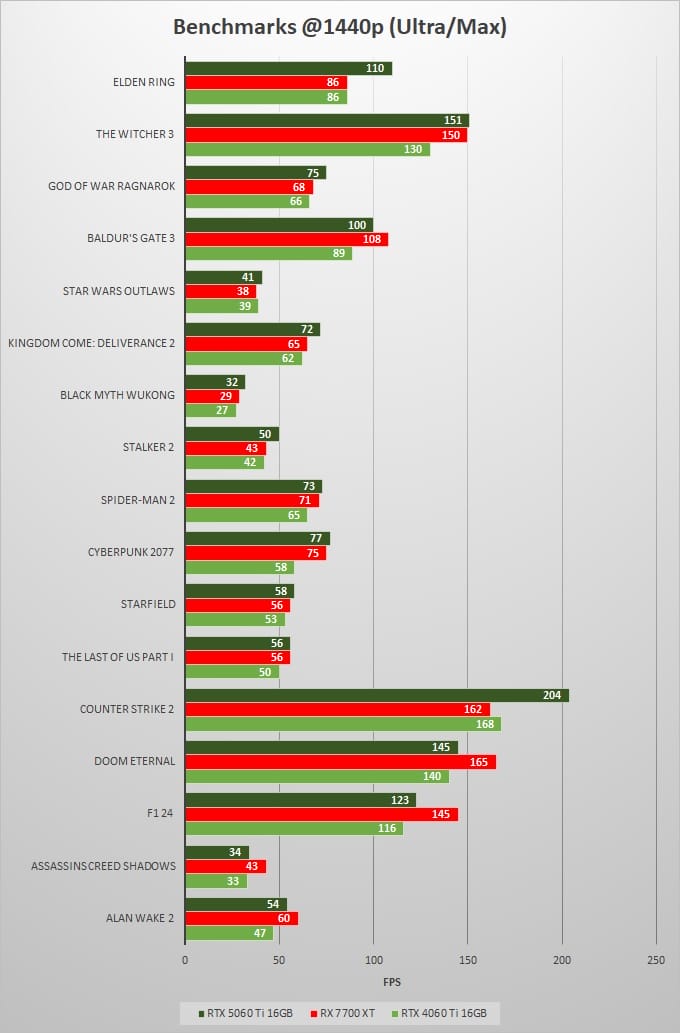
From the above gaming benchmarks, we can see that, on average, the RTX 5060 Ti 16GB is around 2 percent faster than the RX 7700 XT and 13 percent faster than the RTX 4060 Ti 16GB.
Power Consumption
The maximum power consumption of RTX 5060 Ti 16GB and RTX 4060 Ti 16GB is on the lower side at 180W and 165W, respectively. RX 7700 XT has a maximum power consumption of 245W, considerably higher than its competitors.
| RTX 5060 Ti 16GB | RTX 4060 Ti 16GB | RX 7700 XT | |
| Power Connector | 8-pin PCIe / 16-pin 12V-2×6 | 8-pin PCIe | 8-pin PCIe |
| Power Consumption | 180W | 165W | 245W |
| Recommended PSU | 600W | 550W | 700W |
Pricing & Availability
The official base MSRP of the RX 7700 XT is 449 USD, while that of the RTX 4060 Ti 16GB is 499 USD. The RTX 5060 Ti has the lowest official MSRP of 429 USD compared to the other two. The custom models of these cards may cost more, and you can check their latest prices at the links below.
Check RTX 5060 Ti 16GB Price on Amazon
Check RTX 4060 Ti 16GB Price on Amazon
Check RX 7700 XT Price on Amazon
RTX 5060 Ti 16GB vs RTX 4060 Ti 16GB vs RX 7700 XT Specifications
| RTX 5060 Ti 16GB | RTX 4060 Ti 16GB | RX 7700 XT | |
| GPU Chip | GB206 | AD106 | Navi 32 XL |
| GPU Architecture | Blackwell | Ada Lovelace | RDNA 3 |
| Fabrication Process | 5nm | 5nm | 5nm |
| CUDA Cores/Stream Processors | 4608 CUDA Cores | 4352 CUDA Cores | 3456 Stream Processors |
| Ray Tracing Cores | 36 (4th Generation) | 34 (3rd Generation) | 54 |
| Tensor Cores | 144 (5th Generation) | 136 (4th Generation) | 108 |
| Memory Size | 16 GB GDDR7 | 16 GB GDDR6 | 12 GB GDDR6 |
| Memory Interface | 128-bit | 128-bit | 192-bit |
| Memory Speed | 28 Gbps | 18 Gbps | 18 Gbps |
| Memory Bandwidth | 448 GB/s | 288 GB/s | 432 GB/s |
| Bus Interface | PCIe 5.0 x8 | PCIe 4.0 x8 | PCIe 4.0 |
| DirectX | 12 Ultimate | 12 Ultimate | 12 Ultimate |
| OpenGL | 4.6 | 4.6 | 4.6 |
| Vulkan | 1.4 | 1.2 | 1.2 |
| SLI / CrossFire | No | No | No |
| VR Ready | Yes | Yes | Yes |
| G-Sync/FreeSync | Yes | Yes | Yes |
| Power Consumption | 180W | 165W | 245W |
| Recommended PSU | 600W | 550W | 700W |
See also:
Final Words
RTX 5060 Ti 16GB is not a significant upgrade over the RTX 4060 Ti 16GB, except for a few upgrades and new technology. It is slightly faster than the RX 7700 XT, offers 4GB extra VRAM, and has significantly lower power consumption. RTX 5060 Ti 16GB is excellent for 1080p gaming and is also suitable for smooth 1440p gaming. Overall, RTX 5060 Ti 16GB is a decent card for the price and should be a top choice for mainstream and budget-conscious gamers. Please comment below if you want to share your opinion or have any queries.
(*This post may contain affiliate links, which means I may receive a small commission if you choose to purchase through the links I provide (at no extra cost to you). Thank you for supporting the work I put into this site!)
![Best RX 5700 XT Cards for 1440p Gaming [AIB Custom Cards] Best RX 5700 XT Cards for 1440p Gaming [AIB Custom Cards]](https://graphicscardhub.com/wp-content/uploads/2019/08/PowerColor-Red-Devil-Radeon-RX-5700-XT-211x150.jpg)
